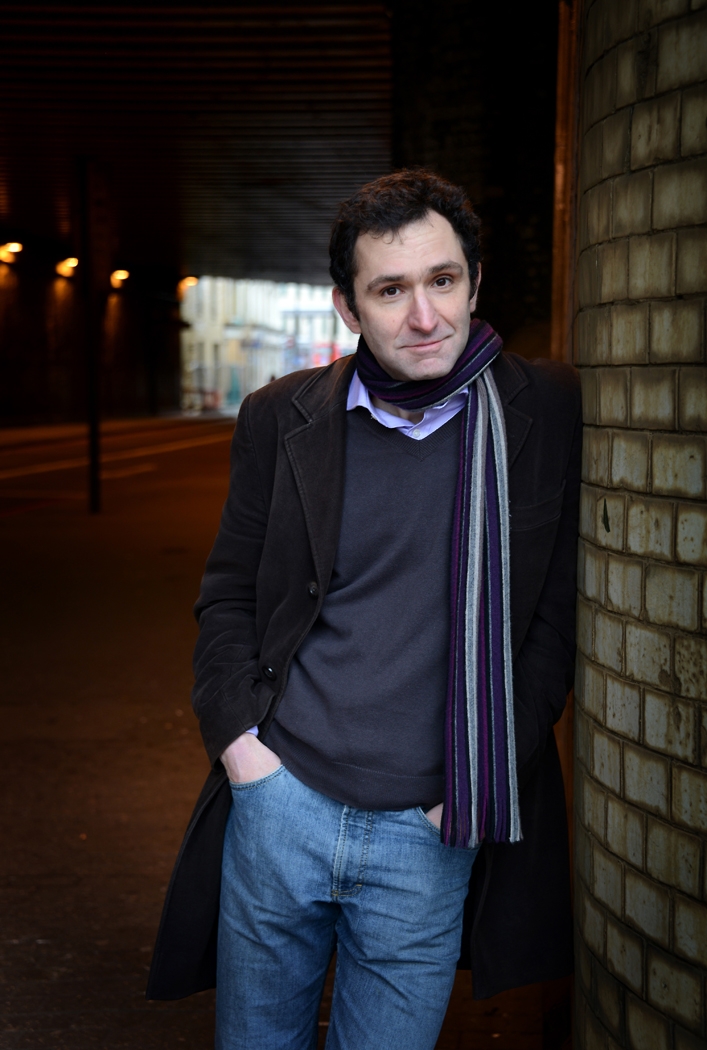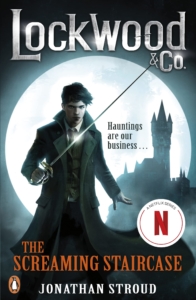
An Interview with Jonathan Stroud
 Jonathan Stroud is the best-selling author of the Bartimaeus Sequence. His latest books, the Lockwood and Co series, follow Lucy Carlyle, Anthony Lockwood and George Cubbins, three young ghost-hunters in a London dominated by supernatural visitants, as they strive to solve cases, balance their books – and stay alive. In addition to this, he is now launching a campaign, Freedom To Think, to help children unleash their imagination through regular, dedicated, creative ‘free time’.
Jonathan Stroud is the best-selling author of the Bartimaeus Sequence. His latest books, the Lockwood and Co series, follow Lucy Carlyle, Anthony Lockwood and George Cubbins, three young ghost-hunters in a London dominated by supernatural visitants, as they strive to solve cases, balance their books – and stay alive. In addition to this, he is now launching a campaign, Freedom To Think, to help children unleash their imagination through regular, dedicated, creative ‘free time’.
Imogen Russell Williams spoke to him for Books for Keeps.
How did you first ‘meet’ the Lockwood characters, and who did you meet first, in your head?
Three years ago, I was looking for a new project, and every morning I would sit down at my desk and just write whatever came into my head. And one morning, I wrote about three pages of what became the beginning of the first book: just a boy and a girl walking up to the door of a house, knocking on the door; they’re going in to deal with a ghost… So, essentially, it was Lucy and Lockwood.
Did you always know that your narrator would be Lucy, the newcomer, rather than the swashbuckling Lockwood?
Well, Lucy was the narrator in that opening scene – so right from the beginning, it was her voice that I heard. And I quite like having a female character as the centre of the story. Later on, I did wonder whether I should change it round, and have Lockwood narrating the second book, and George narrating the third. I tried writing from Lockwood’s perspective, but he is quite a mysterious swashbuckling character, and it’s good to have him slightly at one remove, with Lucy as our intermediary. So, in the end, I stuck with her.
Do you have a favourite character?
When I write, I want all my main characters to have some aspect of my ideal. Lockwood outwardly has that swashbuckling joie de vivre that we would all love to have, and George is slightly more sarcastic, and self-possessed, comfortable in his own skin. And Lucy has that level of uncertainty we all share. But it’s really good fun to mesh them together as a team – bickering and grumbling, but ultimately pulling together.
Where did the idea of the Problem [the wave of supernatural phenomena that’s terrorized British society for fifty years] come from?
I’ve always adored ghost stories; protagonists going into a dark room, something coming out of the past, usually a nasty ending. The best ghost stories are quite short, fairly bleak, harsh, and they give you a proper chill. And I wanted that – I wanted to scare my readers – but I was also interested in embedding it in something wider and more complicated.
So I thought ‘Okay – why are the children going into these houses? Where are the adults?’ Clearly, it must be that the adults are useless for some reason – if they can’t see the ghosts? Then came the idea that the ghosts were everywhere; it wasn’t just a kind of Scooby-Doo thing. It’s a real problem, an epidemic.
And how did the alternate London of the Lockwood books – part Victorian/Edwardian-feeling, part totally contemporary – come about?
As with the Bartimaeus books, I really liked the idea of doing contemporary, but an alternative contemporary, where everything’s been skewed by this element of the fantastic. With Bartimaeus, the fantastic element was that magic existed, and that people had been using djinnis to do their work for them for centuries, so science had taken a back seat, and the magicians were in control. With Lockwood, I was imagining that for the fifty years of the Problem, there’s been less and less technological advancement. People aren’t working so much – they’re shutting up shop at four o’clock in the afternoon – on a winter’s night, they shoot home and cower behind their curtains. What industry there is, is going towards trying to deal with the ghosts.
Which writers influenced you most in writing the Lockwood books?
The top one has to be M.R. James. He’s the master of the English tradition, I think. All his ghosts are pretty nasty, quite subtly done – the ‘face of crumpled linen’ in Oh Whistle, and I’ll Come to You, My Lad is just spectacularly scary – and I wanted to pay tribute to that tradition. At the same time, I wanted to pay tribute to the adventure and detective tradition that you also had then in British literature. Looking back on it, people like Arthur Conan Doyle were doing both; right from the word go, detective stories and occult, supernatural tales are very closely related. And Edgar Allen Poe was doing both, too. It’s all about uncovering secrets, uncovering mysteries.
The Lockwood books are seriously scary! Did you worry about how much you were going to scare your readers?
No, I didn’t worry – I was kind of pleased! [laughs] I’m not one for horror, so much – I’m not someone who enjoys things being repellent, or gory – but it’s all about building up suspense. Slowly building up the atmosphere, little by little by little by little, and then hitting the reader with something suitably nasty – and then leaving it to their imagination. It’s great fun. And I think kids in that kind of 11-14 age range are very much capable of dealing with a few shocks and scares – if they like the characters.
What can you tell me about Book 3?
It’s out in September, it’s called The Hollow Boy, and it’s set about six months down the line from The Whispering Skull. Lockwood and Co are doing OK, but they’re rather overworked, and Lockwood is pondering whether or not he should get somebody else to help; a new assistant. And he does, with various consequences…
And are there going to be more Lockwood books after this one?
There’s certainly going to be four, possibly five. I’ve got a fairly good idea of what number 4 is going to be about, and I’ve got some exciting but rather incoherent notes which I think might turn into a fifth book. And that might be it – but I think it’s good to keep it open.
Do you miss Bartimaeus?
I do! Very much so. I have a Bartimaeus file on my desk with various bits and pieces in it, and I would quite like to revisit Bart at some point, because he is ace [laughs]. But I wouldn’t want to do it unless I could justify it with a proper structure, a story that can weather readers’ interest. A lot of people would like to see Bartimaeus back, but I’d have to do it correctly. Not just for the sake of it – that would be a real shame.
Tell me about your new campaign, Freedom to Think.
It was really born out of watching my own kids, and realising that they’re under a tremendous amount of pressure – time-pressure, and pressure to do things imposed on them from the outside. There’ll be homework, and then all the clubs and the various different instruments and activities. And all of that stuff is good and right, but you need to have those moments, those little periods of time, when you’re not doing any of that scheduled stuff – you’re just potentially sitting around, looking at the sky or picking your fingernails.
And from those moments of quiet, and, essentially, boredom, your brain starts to work and you start to make connections and notice your environment and then get interested and go off and start doing something. You find things that excite you – you get to know a bit more about who you are, what makes you tick; and your creativity gets stimulated. We all have this capacity to be creative, in some shape or another, and you only really find out about it when you have these moments to yourself. So Freedom to Think is just encouraging parents to ring-fence these moments of time for their kids when there is no agenda, and they can do nothing if they want. It’s not necessarily about actually doing anything; it’s just reminding yourself who you are, and where you fit into the world around you.
Imogen Russell Williams is a journalist and editorial consultant, specialising in children’s literature and YA. She writes a trend-spotting biog for the Guardian Online, and seasonal round-ups for The Metro.
The Freedom to Think campaign launched in April via a website where parents are encouraged to share their children’s creative moments in pictures, stories, doodles and videos. The campaign will also provide suggested activities for children (and parents) who want some help sparking their imagination. Find out more about Freedom to Think, view the launch animation or get involved here, or go to the twitter handle: @iamfree2think
Lockwood & Co The Screaming Staircase, Corgi, 978-0552566780, £7.99
Lockwood & Co, The Whispering Skull,Corgi, 978-0552568050, £7.99
The Bartimaeus sequence is published by Corgi, priced £7.99



